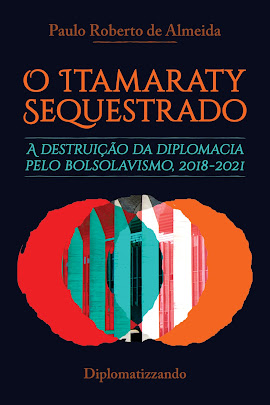Temas de relações internacionais, de política externa e de diplomacia brasileira, com ênfase em políticas econômicas, viagens, livros e cultura em geral. Um quilombo de resistência intelectual em defesa da racionalidade, da inteligência e das liberdades democráticas. Ver também minha página: www.pralmeida.net (em construção).
terça-feira, 21 de janeiro de 2020
A China no WEF de Davos: do socialismo de Deng ao capitalismo de Estado (NYT)
Postagem em destaque
Livro Marxismo e Socialismo finalmente disponível - Paulo Roberto de Almeida
Meu mais recente livro – que não tem nada a ver com o governo atual ou com sua diplomacia esquizofrênica, já vou logo avisando – ficou final...

-
Carreira Diplomática: respondendo a um questionário Paulo Roberto de Almeida ( www.pralmeida.org ) Respostas a questões colocadas por gradua...
-
FAQ do Candidato a Diplomata por Renato Domith Godinho TEMAS: Concurso do Instituto Rio Branco, Itamaraty, Carreira Diplomática, MRE, Diplom...
-
Uma preparação de longo curso e uma vida nômade Paulo Roberto de Almeida A carreira diplomática tem atraído número crescente de jovens, em ...
-
An online publication: The Cold War: by Paulo Roberto de Almeida in: Routledge Resources Online Edited By: Ruud van Dijk Published Online3...
-
Personagens Bíblicos / História do Profeta Samuel: Quem foi Samuel na Bíblia? https://estiloadoracao.com/historia-do-profeta-samuel/ Histó...
-
De um colega de carreira: O que é ser diplomata Por Secretário César Bonamigo O Curso Rio Branco, que freqüentei em sua primeira edição, em...
-
Bibliografia para o concurso do Rio Branco Resumo de uma lista de leituras por: Paulo Roberto de Almeida (Brasília, fevereiro de 2010) ...
-
Canadian Prime Minister Mark Carney blindsides Trump by forming a super alliance of 40 powerful countries to defeat his disastrous MAGA agen...
-
O fim da polarização por Marcos Nobre Revista Piaui, agosto de 2014 Nada de PT ou PSDB: a verdadeira força hegemônica da p...
O que é este blog?
Este blog trata basicamente de ideias, se possível inteligentes, para pessoas inteligentes. Ele também se ocupa de ideias aplicadas à política, em especial à política econômica. Ele constitui uma tentativa de manter um pensamento crítico e independente sobre livros, sobre questões culturais em geral, focando numa discussão bem informada sobre temas de relações internacionais e de política externa do Brasil. Meus livros podem ser vistos nas páginas da Amazon. Outras opiniões rápidas podem ser encontradas no Facebook ou no Threads. Grande parte de meus ensaios e artigos, inclusive livros inteiros, estão disponíveis em Academia.edu: https://unb.academia.edu/PauloRobertodeAlmeida
Site pessoal: www.pralmeida.net.Pesquisar este blog
Quem sou eu: Paulo Roberto de Almeida
Últimas Postagens:
-
▼
2020
(1711)
-
▼
janeiro
(131)
- Juro baixo transforma mercado de crédito e de inve...
- O Brasil virou uma republiqueta? Cosi è, si vi par...
- Écologie politique en Amérique latine: colloque IH...
- O Brasil nas duas guerras mundiais - Mary Del Prio...
- Corrupção: o ex-ministro da Defesa Celso Amorim ap...
- Disputa Moro-Bolsonaro: episódios de baixa polític...
- Deirdre McCloskey, por Fernando Schuler
- General Santos Cruz: a podridão moral dos olavo-bo...
- Voos da FAB: a imoralidade e os abusos continuam -...
- Sobre certas “decisões” do governo - Paulo Roberto...
- Lula-Bolsonaro: um depende do outro - José Nêumanne
- A nação renega seu passado e afunda na mediocridad...
- Interview with economist John Williamson, Washing...
- Conselhos de Claudio Moura Castro aos aposentados ...
- Déficit de Transações correntes no Brasil: Ricardo...
- O início e a disseminação da Grande Guerra: um deb...
- Sete filmes sobre o Holocausto - My Jewish Learning
- A saída do Reino Unido da UE - Rubens Barbosa
- Política externa: rumo a lugar nenhum - Maria Herm...
- Criacionismo seria mais atraso na educação - Cient...
- Lutar contra as estruturas do poder globalista? Es...
- Rui Barbosa, o maior liberal brasileiro, para Chri...
- Bolsonaro e sua circunstância - Editorial Estadão
- Holocausto: memória e reflexão - Benoni Belli (OESP)
- Gazeta do Povo apoia a política de abstinência sex...
- Reitor de universidade criacionista novo diretor d...
- A verdadeira chanceler do Brasil: Tereza Cristina,...
- Do limbo ao limbo, com uma passagem pelo IPRI - Pa...
- A antipolitica do capitão resultará em seu fracass...
- Global Governance in Geneva: Webster University - ...
- Macarthismo Administrativo do Bolsonarismo - Claud...
- Brasil fornece maior superávit comercial para os E...
- Biographies of Great Economists: books selected by...
- A China no WEF de Davos: do socialismo de Deng ao ...
- LIVRES: movimento liberal suprapartidário
- Nota da Anpuh sobre o ministro da Deseducassão (el...
- Relatório da Oxfam sobre a Desigualdade: uma fraud...
- A política externa do governo Bolsonaro está no ca...
- In Davos, a search for meaning with capitalism in ...
- A super riqueza de 22 homens e a extrema pobreza d...
- Os adidos do agronegócio brasileiro - Época Negócios
- Cai o secretário, fica o projeto - Miriam Leitão (...
- Nos tempos do stalinismo fotográfico - Masha Gesse...
- The Legacy of Martin Luther King, Jr. - The New Yo...
- Afinal, os nazistas eram capitalistas, socialistas...
- Maquiavel: o primeiro realista da política - Arnal...
- Demissão do secretário pró-nazista não muda Bolson...
- Google Scholar: citações a trabalhos de Paulo Robe...
- Iran-USA: "Hybrid" Wars Confront « Might Makes Rig...
- Kindle books: livros mais recentes de Paulo Robert...
- Elogio da burguesia (com uma deixa para a aristocr...
- OCDE e resultados - William Waack (O Estado de S. ...
- Brasil na OCDE: O que o país cedeu aos EUA em troc...
- Entrevista sobre a diplomacia brasileira e as rela...
- Livro revela a face mais obscura de Olavo de Carva...
- Metapolitica: de Wagner a Hitler, e ao chanceler a...
- Notícias do "liberalismo" brasileiro: tabela de fr...
- Global risks: World Economic Forum - Davos
- Nacionalismo, antiglobalismo: o que pode diminuir ...
- Economist: editorial sobre o acordo comercial EUA-...
- Papa Francisco: uma boa alma reformista, mas econo...
- China challenge to the US: Belfer Center prized pa...
- EUA continuam a ver a China como adversária - Coun...
- A paranoia intelectual anti-China apresentou respo...
- Mapa da riqueza mundial: Brasil tem menos de 1 por...
- Holodomor, o genocídio soviético contra o povo ucr...
- Militares em operações de peace-keeping e funções ...
- O pior acordo comercial da história: Trump contra ...
- 2019 no blog Diplomatizzando: um ano de acessos - ...
- Em livro, jornalista diz que Bolsonaro mandou Quei...
- Jornalista revela segredos do primeiro ano do gove...
- Livro sobre o primeiro ano do governo Bolsonaro - ...
- Brasil sai da CELAC, criada por Lula em 2010 (FSP)
- US-China Trade Agreement: resumo por Paulo Roberto...
- Política Externa: balanço do primeiro ano da Bolso...
- Brasil esconde ditadura e fala em anistiar crimes ...
- Pagina PRA em Academia.edu: um ano de acessos
- A Diplomacia do Casuismo - Ana Clara Costa (Epoca)
- Um dia na vida de Brasilino: um monumento ao anti-...
- Sefaria: biblioteca digital de textos judaicos num...
- Roger Scruton: Swimming Always Against the Tide - ...
- Eça de Queiroz: artigos diplomáticos de mais de um...
- Rubens Barbosa: a França dividida (OESP, 14/01/2020)
- Economic and Business History Society Conference -...
- Política Externa do Brasil: mais uma semana de ale...
- O nosso dilúvio: o novo Festival de Besteiras que ...
- Resenhas dos melhores livros do ano - Amálgama
- É a cultura, estúpido - Luiz Marcelo Berger
- Armaldo Godoy: A parábola da Justiça (Conjur)
- Trajetória socioeducacional dos ministros brasilei...
- Os militares e o governo Bolsonaro - Entrevista Jo...
- O Brasil e o conflito Irã-EUA - Entrevista com o P...
- Trabalhos mais acessados em Academia.edu - Paulo R...
- Travaux en Français (1972-2019) - Paulo Roberto de...
- A selection of works on Brazilian Foreign Policy a...
- The Drama of Brazilian Politics, 1815 to 2015 - Bo...
- The (non-)continuity of Lula’s diplomacy under Dil...
- João Cabral de Melo Neto, 100 anos - poemas coment...
- Economic Growth By Robert J. Barro and Xavier I. S...
- Brazilian Foreign Policy under Lula - Paulo Robert...
-
▼
janeiro
(131)
Contra a Corrente: ensaios contrarianistas
Pesquisar este blog
Obras do autor:
Prata da Casa: os livros dos diplomatas
Volta ao Mundo em 25 Ensaios
Paralelos com o Meridiano 47
O Panorama visto em Mundorama
Rompendo Fronteiras
Codex Diplomaticus Brasiliensis
Polindo a Prata da Casa
Livros editados por PRA
Colaboração a livros coletivos
Capítulos de livros publicados
Teses e dissertações
Artigos em periódicos
Resenhas de livros
Colaborações regulares
Videos no YouTube
Paulo Roberto e Carmen Lícia

No festival de cinema de Gramado, 2016
PRA on Academia.edu
PRA on Research Gate
Works PRA
- Carreira na diplomacia
- Iluminuras: minha vida com os livros
- Manifesto Globalista
- Sun Tzu para Diplomatas: uma estratégia
- Entrevista ao Brasil Paralelo
- Dez grandes derrotados da nossa história
- Dez obras para entender o Brasil
- O lulopetismo diplomático
- Teoria geral do lulopetismo
- The Great Destruction in Brazil
- Lista de trabalhos originais
- Lista de trabalhos publicados
- Paulo Roberto de Almeida
- Works in English, French, Spanish
Outros blogs do autor
Total de visualizações de página
Détente...

Carmen Lícia e Paulo Roberto
Links
Uma reflexão...
Extratos (adaptados) de Ciência: problemas, objetivos e responsabilidades (Popper falando a biólogos, em 1963, em plena Guerra Fria):
"A tarefa mais importante de um cientista é certamente contribuir para o avanço de sua área de conhecimento. A segunda tarefa mais importante é escapar da visão estreita de uma especialização excessiva, interessando-se ativamente por outros campos em busca do aperfeiçoamento pelo saber que é a missão cultural da ciência. A terceira tarefa é estender aos demais a compreensão de seus conhecimentos, reduzindo ao mínimo o jargão científico, do qual muitos de nós temos orgulho. Um orgulho desse tipo é compreensível. Mas ele é um erro. Deveria ser nosso orgulho ensinar a nós mesmos, da melhor forma possível, a sempre falar tão simplesmente, claramente e despretensiosamente quanto possível, evitando como uma praga a sugestão de que estamos de posse de um conhecimento que é muito profundo para ser expresso de maneira clara e simples.
Esta, é, eu acredito, uma das maiores e mais urgentes responsabilidades sociais dos cientistas. Talvez a maior. Porque esta tarefa está intimamente ligada à sobrevivência da sociedade aberta e da democracia.
Uma sociedade aberta (isto é, uma sociedade baseada na idéia de não apenas tolerar opiniões dissidentes mas de respeitá-las) e uma democracia (isto é, uma forma de governo devotado à proteção de uma sociedade aberta) não podem florescer se a ciência torna-se a propriedade exclusiva de um conjunto fechado de cientistas.
Eu acredito que o hábito de sempre declarar tão claramente quanto possível nosso problema, assim como o estado atual de discussão desse problema, faria muito em favor da tarefa importante de fazer a ciência -- isto é, as idéias científicas -- ser melhor e mais amplamente compreendida."
Karl R. Popper: The Myth of the Framework (in defence of science and rationality). Edited by M. A. Notturno. (London: Routledge, 1994), p. 109.
Uma recomendação...
“Por favor, não se tornem hayekianos, pois cheguei à conclusão que os keynesianos são muito piores que Keynes e os marxistas bem piores que Marx”.
(Recomendação feita a jovens estudantes de economia, admiradores de sua obra, num jantar em Londres, em 1985)
ShareThis
Academia.edu |
|


















Nenhum comentário:
Postar um comentário